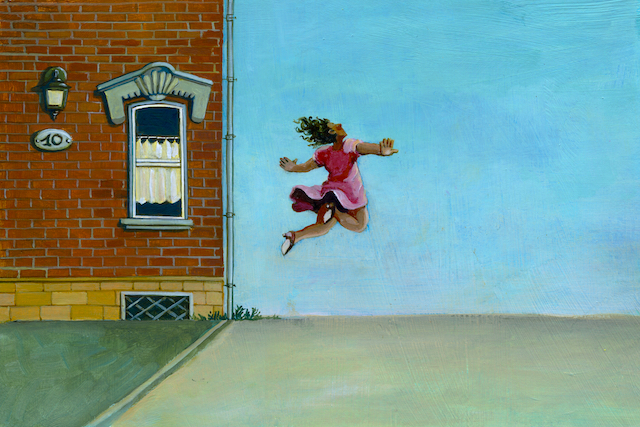
“The totality of my possessions reflects the totality of my being. I am what I have … What is mine is myself.” ~Jean Paul Sartre
What kind of relationship do you have with your stuff?
Embracing who we are naturally requires a letting go of who we aren’t, but perhaps want to be. That ties directly to our physical belongings, which can renew and inspire us in the direction we’re headed—or hold us back.
Over the years, I’ve found that the objects with the most powerful grip on us are not necessarily those we use frequently and with ease, but the “aspirational” items that we wished we used more.
The sleek high heels that never come out of the closet, because they’re too impractical to actually wear. The exercise bike that grows rusty in the basement. Or in my case, the high-end digital camera I just sold on eBay.
The Lightness of Letting Go
The camera is three or four years old at this point, but it takes amazing pictures. My partner at the time suggested I buy it before a big vacation to Istanbul, though I didn’t need much convincing.
The idea of capturing the world through a lens and expressing myself creatively excited me. I liked the vision I saw for myself—someone with an eye for detail, with original, hand-crafted art on her walls to boot. This person sounded very clever and interesting.
But what I quickly came to realize is that the actual process of taking photos, let alone editing them, held less appeal.
My traveling companion used the camera on that trip far more than I did—he at least knew what to do with all those dials and buttons, whereas I had skipped reading the manual. It turned out my iPhone and a few Instagram filters were really all I needed to be satisfied. (So basic, I know.)
Still, I held on to the camera for several more years, dutifully lugging it with me on trips and adventures, though it rarely came out of my bag. Even when I did snap pictures, they almost never came off the memory card.
These unused items can take up a lot of space, but it’s the emotional burden, not the physical one, that really weighs us down.
Every time I looked at my camera, I was struck by a pang of guilt. For wasted money, wasted potential.
I’m rational, even ruthlessly unemotional, when it comes to most of my possessions, but this camera had a hold over me. I put off getting rid of it in the hopes that inspiration—or at least some motivation— would strike.
Finally, this winter, I accepted what had already been true for quite a while: I’m not a photographer. And that’s okay.
I sold the camera online and instantly felt better. The guilt was gone, my shelf was empty, and my wallet full. This time around, I plan to spend the money on something closer to my heart—an investment in my writing, some yoga classes or even a meal out with friends.
Taking Stock for Yourself
Here are a few things I considered when I accepted that my dreams of being a photographer, even a decent amateur one, were just that.
Listen to your own stories.
What stories run through your head when you look at an object that you don’t use but can’t seem to part with? How do you plan to use it and is that realistic?
These stories are illuminating because they help us identify our true motivations.
I rarely thought about planning my shots or the subsequent hours required in front of the computer to review my work—the nuts and bolts of photography. And when I did consider these tasks, it was not with much fondness.
Watch out for the dreaded “shoulds.”
As I’ve learned, it can be far too easy to conflate what we should want to do with what genuinely calls to us. Do the objects you cling to support the person you are and the activities you enjoy, or do they speak to some idealized identity in your mind’s eye?
Author Gretchen Rubin writes frequently about what she considers the most important of her “personal commandments”—her commitment to just “Be Gretchen.” This has meant admitting she’ll never have a glamorous wardrobe or enjoy late-night jazz clubs, even if she likes the idea of these things in theory and sees why other people cherish them.
“If something was really fun for me, it would pass this test: I looked forward to it; I found it energizing, not draining; and I didn’t feel guilty about it later,” she suggests in The Happiness Project.
Let your possessions be physical reminders of what’s really fun for you.
Consider substitutes.
It’s possible your desire to hang onto something is telling you more than you think.
I had a similar experience with a bicycle I bought the better part of a decade ago. It was a beautiful Italian road bike from the eighties, and I snatched it up on Craigslist, putting aside the fact that it wasn’t quite the right fit and that I didn’t feel comfortable riding it.
I held onto the bike through several moves across states despite rarely using it, thanks to that familiar tug of guilt and desire.
It was only in the past year that I finally invested in a new bike, one with upright handlebars, fatter tires, and easy-to-change gears. It fits me and I ride it everywhere. This one also has less emotional power over me. It’s functional, a tool I use for getting around—not a symbol for the kind of person I wish to be.
Can you tweak what’s not working?
Think about who else might gain.
When I did finally sell my camera, it helped to convince myself that I was giving someone else the chance to enjoy it at a reduced cost. I hope the buyer finds the joy I’d been seeking, but never actually found.
Could others use the items you’re clutching so hard? Consider letting go a gift to the world—one that will also free you to embrace your true self more fully.
About Victoria Finkle
Victoria Finkle is a business and policy writer based in D.C. You can find more of her work at victoriafinkle.com or sign up for her monthly newsletter, INDEED, which features bite-sized Q&As with experts in psychology, history, economics and more.












 Though I run this site, it is not mine. It's ours. It's not about me. It's about us. Your stories and your wisdom are just as meaningful as mine.
Though I run this site, it is not mine. It's ours. It's not about me. It's about us. Your stories and your wisdom are just as meaningful as mine.
When I first started to declutter, I found it very hard to let go of things…an old movie receipt that had sentimental value, or an object that I bought a long time ago that I thought I would use, but of course end up not.
Over time, I realized that some of the things I was holding on to was unhealthy and that letting go was the first step towards moving on. These days, I have a far easier time donating or throwing away old things.
I also look at it this way: We have to make space for the good in our lives. As a simple example, donate the clothes in your closet that you last wore 2 years ago. I’m willing to bet that new clothes will soon fill that void. Nature abhors a vacuum.
very nicely written article, and I totally agree with your comment,once you get on with the starting trouble for decluttering ..all comes easily, I have felt same but yes it is far more relieving to give away things which are not of use to you anymore.same applies to relationships i guess, we feel better when we let go of old/outdated feelings.
thanks for the article 🙂
Thanks for reading it! 🙂
I agree, it’s definitely a habit that builds on itself. Thanks for reading!
LOVE this; what great advice!
I struggle with this very thing; I finally seem to have stopped myself from bringing in more such items, and I’ve made some progress with letting go of existing ones.
(Ms. Rubin’s comment about late-night jazz clubs had me laughing out loud! Although I love and enjoy live classical music, opera LITERALLY puts me to sleep. I actually slept through Carmen.) (AND Boris Godunov, but that’s probably not just me!)
Great article . This reminds me of “the life changing magic of tyding up” by Marie Kondo.